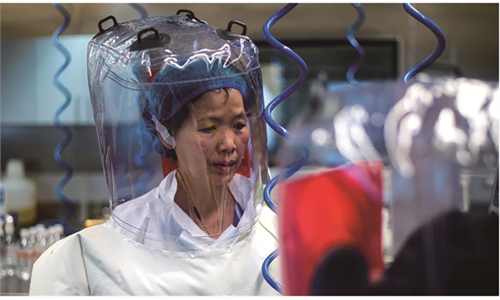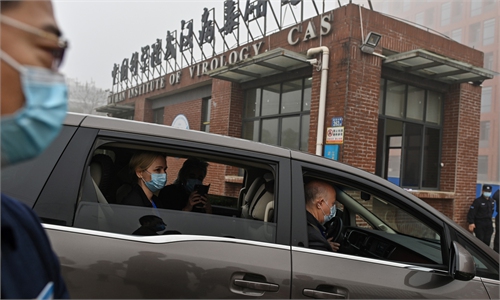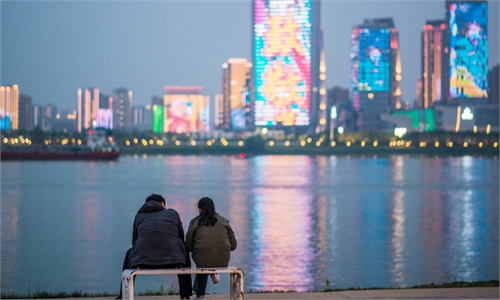The 2020 Spring Festival did not go as Wuhan people had expected. On Chinese New Year's eve last year, the 11-million-population city was put into a lockdown unparalleled in modern society that lasted for 76 days. A year on, the most important festival for Chinese people is approaching again. How are people in Wuhan, still reeling from the pain brought by the coronavirus, celebrating this time round?
The smell of preserved pork wafts through the lanes of Wuhan, and red lanterns hang on street lamps. The festival mood is brewing in the capital city of Central China's Hubei Province, but local residents said it is "the quietest Spring Festival" they have ever experienced.
After suffering the panic and agony of the virus, emerging from lockdown in a swoon and then moving on cautiously after life returned to normal, many Wuhan people reached by the Global Times said they will "stay put, and quietly celebrate the Spring Festival this year… We don't want to bring trouble to others or to our country."
With two Spring Festival celebrations in a row overshadowed by the coronavirus, Wuhan people this year are voluntarily choosing to avoid gatherings and maintaining social distance. As survivors of the crisis, one Wuhan resident said people in this city were hurt the hardest, which is why they know better how to protect themselves and others.

Wuhan Photo:GT
Quietest Spring Festival
Four days before Chinese New Year, which falls on February 12 this year, Wuhan resident Xiao Lin was shopping in the city's bustling Jiqing street in preparation for the festival. "This year it will be just my parents and me, no other relatives, as we agreed on no gatherings during Spring Festival," she said.
For 25-year-old Xiao, this year is "the quietest Spring Festival" she has ever spent in Wuhan, the city she grew up in. "We will have video chats with all our relatives on Spring Festival eve and show them our dishes. It's actually nicer, because in the past, although we were physically together, people just looked at their phones. But this year, even though we will be apart, our minds will be closer," Xiao said.
Another Wuhan resident, surnamed Huang, recalled, "I was struck by so many things that I never thought would happen during a Spring Festival: My city suddenly topped headlines worldwide, renowned hospitals in the city were asking for masks and protective suits, and I was talking to my friends on WeChat about where the ambulances were going…"
Huang said that this year, only one thing is for sure - people around her survived the virus, "and that's the biggest celebration, the best gift life has to offer, being alive."
"After what we went through last year, we will stay put and avoid (unnecessary) gatherings. We don't want to bring trouble to others or to the country," she laughed.
Not bringing trouble to others or to the country is the most common reason Wuhaners cited when being asked by the Global Times how they feel about the government discouraging travel and recommending that people "stay put" for the holiday.
The Spring Festival is Chinese people's most important festival, where dining together with family members is a tradition. However, one Wuhan restaurant manager surnamed Wang told the Global Times that only 40 percent of their tables have been booked. "Previously, 95 percent of our tables would have been booked by this time."
"With Spring Festival approaching, Wuhan began tightening its virus prevention measures again, such as scanning health codes when entering supermarkets, and loudspeakers in residential compounds warning people to avoid gatherings," Wuhan resident Chen Hao told the Global Times.
To ensure a safe but happy Spring Festival, the Wuhan city government has also rolled out a series of measures, such as preparing festive shows and tours for residents, while delivery companies will continue to operate during the holidays.
In December, the Hubei provincial government issued a guideline seeking a reduction in the flow of people and the number of group gatherings, along with strengthened personal and community prevention efforts.
Supermarkets in Wuhan are still dotted with shoppers vying to purchase commodities for Spring Festival, while carefully obeying social distancing and wearing masks. "After all it's Chinese New Year, the viral spread started here, we have reason to celebrate, but not to let all our previous efforts go up in smoke," said Huang.
Wuhan has set its GDP growth target at 10 percent for 2021, the Xinhua News Agency reported in January. The capital city of Hubei Province managed to stage a strong economic recovery last year after its GDP shrank by 40.5 percent year on year in the first quarter due to a long lockdown to contain the epidemic.
Moving forward
"It is hard to believe that 2020 is over. But luckily, I finally have a chance to celebrate the Lunar New Year with my family," said Ling Chumian, a Wuhan-based anesthetist.
One year ago, Ling spent an unforgettable Lunar New Year with his mother after she drove overnight from Yichang, a city 310 kilometers away from Wuhan, and tried to bring him home, just as the city was about to be locked down to curb the virus spread.
"I put my luggage in her car and slammed the trunk. But just I was about to get into the car, I made a decision: stay," Ling told the Global Times. "On January 24, 2020 - Lunar New Year's Eve - I had a very shabby 'family reunion' dinner with my mother. After that, I began my life of shuttling between hospital and home."
On February 12, 2020, Ling volunteered to work in another hospital and was then quarantined in a hotel. His mother lived in his rented apartment for 76 days, until the city finally lifted its lockdown.
"Many people's lives stayed in the winter, but most moved forward. I will never forget that special Lunar New Year staying with my mother, but all the pains, grief, love and courage have become rooted in my mind," Ling said.
On the way back home, Ling took a selfie sitting down with his family to enjoy a delicious meal, but sometimes he remembers the simple meal with his mother last winter - a bottle of sweet dumplings.
Healing the pain
When Wuhan resident Jiang Huan (pseudonym) invited her mother, who is in her 80s, to celebrate Spring Festival with her and her family, she refused.
"My father died last Spring Festival because of coronavirus. According to tradition, we are not allowed to celebrate the festival in someone else's place, and now my mother told me she prefers to be alone," said Jiang. "I have no expectations for this Spring Festival."
Each day nearer the festival, Jiang's heart sinks a little more, especially when her child keeps asking her where his grandpa is, and she knows her fathers' specialty dishes will never appear on the table again.
Jiang said between grieving over her deceased father and trying to boost her mother's spirits, she has to find the way to grow stronger and bring life back on track.
Jiang later became obsessed with news reports, documentaries and movies about the Wuhan people's struggle during the 76-day lockdown. "Only by seeing those things can I guess what my father faced when staying in that hospital alone, and I feel connected with him," she said.
"Sometimes I wondered why my father became one of the very small number of confirmed patients," Jiang said.
But Jiang has no complaints. She said her father would not have been admitted into hospital if it hadn't been for the help of her friends who repeatedly called the hotline, and Wuhan would not have rebounded so fast if it hadn't been for help from all over the country, even the world.
She said she only felt the festival mood when walking on the street and seeing red lanterns hanging on street lamps. "It is the quietest Spring Festival I have spent in Wuhan. At least our lives have returned to normal, thanks to people who helped and scarified for us. And we Wuhan people have also become stronger over the last year, as we need to heal the pain that remains deep inside our hearts by ourselves."
Models for next generation
While some mourn lost lives on this traditional holiday, some are welcoming new ones.
Chen Xingxu, founder of the Wuhan 520 Volunteer Alliance, a volunteer group that helps COVID-19 patients get admitted into hospitals, is waiting anxiously for his wife to give birth.
"Her due day is supposed to be around Spring Festival. It's a rebirth, a new start for me," Chen said.
After Chen led his volunteer group through Wuhan's lockdown, he established a charity group to help those who had lost family members during the epidemic, and those who are struggling because of the pandemic.
As a businessman, Chen used to believe that people are all out for themselves. But after volunteering for a day and seeing a girl carrying 25 kilograms of disinfectants and trucks transporting donations from Pakistan, he has changed his mind.
"I was brought up with stories of national heroes who sacrificed themselves for the country. I didn't buy into those stories before, as I thought they were too fanciful to be true," said Chen.
He noted that he now believes them, adding, "I also want my new baby to believe that. I want her to grow up listening to stories of how Wuhan people conquered the virus. There is bravery, selflessness and strong national cohesiveness deep inside the Chinese people. Maybe those traits are invisible in our daily lives, but they will emerge once the country is in a crisis."
According to Chen, Wuhan people feel sad about not being able to celebrate this Spring Festival, after the last one fell victim to the outbreak. "But people are understanding, and even have a little pride in being survivors. Being alive is the biggest thing to rejoice for this Lunar New Year, especially after seeing what is happening in the West."
Coronavirus cases have surged across much of Europe and the US after Christmas celebrations, even though people were warned to avoid large gatherings beforehand.
"From what I read, the Western media always says it is the so-called draconian social restrictions that helped China quell the viral spreading. It's not," said Chen.
"You ask so many people to sacrifice their only chance in the whole year to celebrate with their family members, and they follow without complaining. There's only one place that can do that - China," Chen noted.





